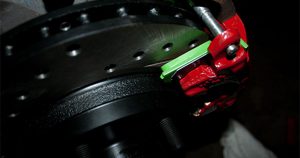 As they’re one of the most important components of your vehicle, you rely on your brakes every day. But how do you know if your brakes are in need of repair? We’ve put together this short list of some of the most common warning signs.
As they’re one of the most important components of your vehicle, you rely on your brakes every day. But how do you know if your brakes are in need of repair? We’ve put together this short list of some of the most common warning signs.
-
Brake Pad Thickness
Examine your car’s brake pads periodically. You should be able to get a good look at them through the spokes of your wheels. As long as the pads are at least one-quarter of an inch thick, they are probably in good shape. If the pads are any thinner, though, they may have worn out beyond their useful lifespan and will need to be replaced.
Checking the pads is one of the best ways to see how your brakes are doing because it involves clear visual evidence instead of the interpretation of mysterious noises. But sometimes you’ll need to use your ears, too.
-
Squealing or Squeaking Brakes
If you’ve ever applied your vehicle’s brakes and heard a long, drawn-out squealing sound, you’ll know exactly what we’re talking about. There’s good news and bad news about this particular noise, though.
The good news is that your brakes probably aren’t about to fail catastrophically. The squeaking noise you’re hearing is generated by a small metal shim that’s designed to make this noise when it’s time for new brakes. The bad news, of course, is that it’s time for new brakes. This little shim may be a non-vital brake component, but it’s important to have your car serviced before anything more serious goes wrong.
-
Decreased Performance
Pay attention to how your brakes feel when you’re using them. This is a more vague concept than listening for a squeal or checking the thickness of the pads, but it’s equally important. Some major warning signs are longer stopping distances, a spongy or soft feeling when you brake, shuddering when braking, and the vehicle pulling to the side when braking. The longer you drive when encountering these symptoms, the more damage to your vehicle you’re risking. Remember, braking is driven by a metal-on-metal contact action, and any mechanical problem with your brakes could have serious consequences.
-
Scheduled Replacement
The passage of time can be another reason to have your brakes replaced. Unfortunately, there is no universal rule when it comes to replacing your brakes on a regular schedule. Consider your driving habits; if you apply the brakes smoothly and gradually, you can prolong their lifespan. In contrast, riding the brakes and braking abruptly can wear them out more quickly. Traffic patterns are another element to keep in mind. If you drive in stop-and-go traffic, you’ll be using the brakes more often.
Finally, the materials from which the brakes are made can actually affect longevity. We recommend consulting your mechanic to establish a schedule.
Routine maintenance is just one element of owning a vehicle, and brakes are one of the most important parts of any car. Follow these simple tips and pay careful attention to any warning signs you notice.
Image via Flickr by aresauburn | CC BY-SA 2.0.


